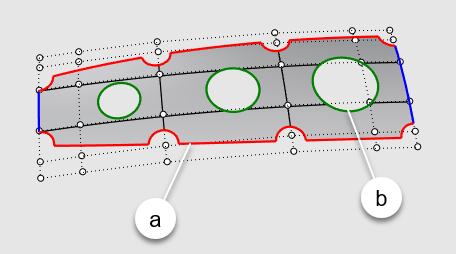Trim
|
Toolbar |
Menu |
Shortcut |
|---|---|---|
|
Curve Drawing
|
Edit Trim |
Ctrl (CMD) + T |
The Trim command cuts and deletes selected portions of an object at the intersection with another object.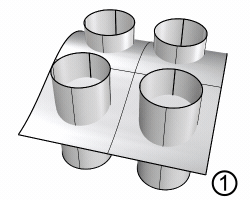
① Only the surface is selected as the cutting object. The pipes won't trim the surface.
② All objects are selected as cutting objects. The surface and pipes can trim each other.
|
Cutting object |
Object to trim |
|---|---|
|
|
Steps
-
Select the cutting objects.
If the cutting objects are also to be trimmed, you can preselect all the objects before starting the command.
-
Select the parts of other objects or the cutting objects themselves to trim away.
Shift+click near a curve end to extend the curve to the cutting objects.
-
Holes in hatches can be removed by the UntrimAll command.
Command-line options
ExtendCuttingLines
Imaginary extensions of the line are used. This makes it unnecessary to manually extend lines that do not intersect the objects to trim.
ApparentIntersections
Determines whether or not curves are trimmed in relation to the view. They do not need to intersect in 3-D space. They only need to appear to intersect in the active viewport.
This option does not apply to surfaces.
- If it is difficult to select the parts to trim off, use the Split command and then delete the unwanted parts.
- Use the Untrim command to remove a trimming boundary from a surface.
- When trimming a surface with a curve in a plan parallel view like the default Top, Front, and Right view, the cutting curve is projected on the surface in the view direction.
- When trimming a surface with a planar curve in an angled parallel or a perspective view like the default Perspective view, the cutting curve is projected on the surface in a direction perpendicular to the curve plane.
- When trimming a surface with a 3-D curve in an angled parallel or a perspective view, the cutting curve is pulled on the surface by closest points.
Line
Draw a temporary line to use for the cutting object.
Trimmed Surfaces
A trimmed surface has two parts: a surface that underlies everything that defines the geometric shape, and trimming curves that either trim away the outside portion of the surface or cut holes in its interior.
Those trimming curves exist on the underlying surface. The underlying surface may be larger than the trim curves, but you won't see the underlying surface because Rhino doesn't draw anything for the part of the surface that is outside the trim curves.
Only the underlying surface defines the actual geometry of the shape. The trim curves do not define a surface -- they only mark which part of the surface is to be considered trimmed away.
If you have a trim curve that runs diagonally across a surface, the trim curve itself doesn't have any real relationship to the control-point structure of the surface. You can see this if you select such a trimmed surface and turn its control points on. You'll see the control points for the whole underlying surface, which doesn't necessarily have any connection with the trim curves.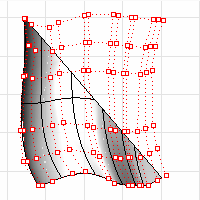
You can remove the trim curves and get back to the underlying surface using the Untrim commands to remove holes or outside boundaries.
When you have a trimmed surface whose underlying surface is much larger than the outside trimming boundary, you can use the ShrinkTrimmedSrf command to shrink the surface back so that it is only large enough to hold the trimming boundaries and doesn't have a large extra unused area.
Note about trimming a polysurface
To trim a polysurface with a curve in a non-plan view, if the cutting curve has any portion evaluated as not completely lying on the polysurface, the Trim command will fail as designed.
Related commands
| Toolbar | Menu |
|---|---|
|
Curve Drawing
|
Surface Surface Edit Tools > Untrim Detach Trim |
The Untrim command removes trim curves and surfaces joined at trim curves from a surface.
Steps
- Select the edge boundary of a trimmed surface.
| Command-line options | |
|---|---|
|
KeepTrimObjects |
Determines whether or not the original trimming objects and joined geometry are separated and retained or deleted. 
KeepTrimObjects=Yes (left); KeepTrimObjects=No (right). |
|
AllSimilar |
In the image above, the surface boundary consists of trimmed (red) and untrimmed (blue) edges. Holes are trimmed edges (green) that do not touch the boundary. Yes
No
|
ReplaceEdge
| Toolbar | Menu |
|---|---|
|
|
Surface Edge Tools > Replace Edge |
The ReplaceEdge command re-trims the selected trimmed surface edge with a line, extensions of the adjacent edges, or a curve.
Steps
- Select surface edges to delete.
| Command-line options | |
|---|---|
|
KeepTrimObjects |
Determines whether or not the original trimming objects are retained. |
|
Mode |
ReplaceWithLineReplace the edge with a line between the edge end points. ExtendSideEdgesThe two surrounding edges extend. The edges must meet within surface boundary to give successful results. SelectCurveEdges will be replaced using the selected curve to retrim. |
| Toolbar | Menu |
|---|---|
|
|
Surface Surface Edit Tools > Untrim All Detach All |
The UntrimAll command untrims interior (holes) and exterior trims from the selected surfaces all at once.
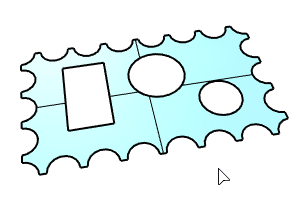
-
Holes in hatches can be removed by the UntrimAll command.
KeepTrimObjects
Determines whether the interior and exterior trims will be preserved as curves.
| Toolbar | Menu |
|---|---|
|
|
Surface Surface Edit Tools > Untrim Border Detach Border |
The UntrimBorder command untrims all exterior trims of the selected surfaces. Interior trims (holes) will remain.
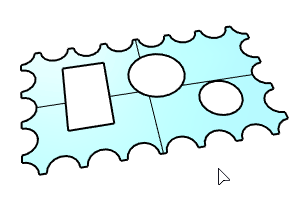
KeepTrimObjects
Determines whether the exterior trims will be preserved as curves.
| Toolbar | Menu |
|---|---|
|
|
Surface Surface Edit Tools > Detach Holes Untrim Holes Solid Solid Edit Tools > Holes > Delete Hole |
The UntrimHoles command untrims selected holes (interior trims) that do not touch surface borders.

-
This command also untrims the holes in polysurfaces.
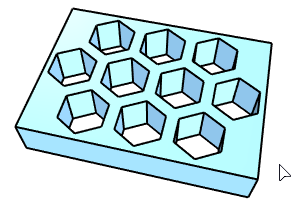
Steps
-
Run the command.
Or, preselect hole edges with Shift+Ctrl (CMD) before the command runs.
-
Select hole edges individually.
Or use window selection.
Command-line option
All
Yes
Deletes all holes on the selected surfaces.
No
Lets you pick the holes you want to delete.
MaximumEdgeLength
Type a maximum edge length number, or pick an existing hole edge to set the length.
Holes with edges equal to or smaller than this value can be deleted individually or all at once, depending on the setting of the 'All' option.
KeepTrimObjects
Determines whether the objects used to make the holes will be preserved.

